Baidicheng (Baidi City) is located on the north bank of the Yangtze River at the mouth of Qutang Gorge in Fengjie County, Chongqing, and is a national 5A-level tourist attraction. Baidicheng has profound historical and cultural heritage and unique natural scenery, with a scenic area of approximately 10.5 square kilometers. Baidicheng is an ancient mountain city. The existing buildings such as the Baidi Temple cover an area of about 17 mu. The layout of the buildings in the temple is rigorous, with red walls and blue tiles, showing a magnificent momentum. It guards the mouth of Qutang Gorge, surrounded by water on three sides and backed by mountains on one side. Its terrain is dangerous, making it a strategically important place for military strategists since ancient times. It is also an excellent spot to enjoy the magnificent scenery of the Three Gorges of the Yangtze River.
Historical Culture
Baidicheng has a long history. At the end of the Western Han Dynasty, Gongsun Shu occupied Shu and built a city on the mountain. Because a well in the city often emitted white gas, like a white dragon, Gongsun Shu took this opportunity to call himself the "White Emperor", hence the name Baidicheng.
During the Three Kingdoms period, Liu Bei was defeated in the war against the Eastern Wu and retreated to Baidicheng. On his deathbed, he entrusted his son Liu Chan to Zhuge Liang in the Yong'an Palace of Baidicheng, making Baidicheng an important site of the Three Kingdoms culture. Since then, many literati such as Li Bai, Du Fu, and Liu Yuxi have visited Baidicheng and left a large number of well-known poems, such as Li Bai's "Departing from Baidicheng in the Morning", adding a strong cultural atmosphere to Baidicheng.
The architecture of Baidicheng integrates the styles of the Ming and Qing dynasties. The Baidi Temple also preserves many ancient inscriptions and cultural relics, which are important materials for studying ancient Chinese history and culture and have witnessed the changes of Baidicheng in the long river of history.
Main Attractions
Baidi Temple
Baidi Temple is the core attraction of Baidicheng, covering an area of about 17 mu. The main buildings in the temple include Mingliang Hall, Wuhou Shrine, Star - watching Pavilion, etc. Statues of Liu Bei, Zhuge Liang, Guan Yu, Zhang Fei and other figures are enshrined in Mingliang Hall, showing the historical figures and stories of the Three Kingdoms period; Wuhou Shrine was built to commemorate Zhuge Liang, and there are statues of Zhuge Liang and related historical relics in the shrine; the Star - watching Pavilion is said to be the place where Zhuge Liang observed the stars at night, with pavilions and towers, simple and elegant.
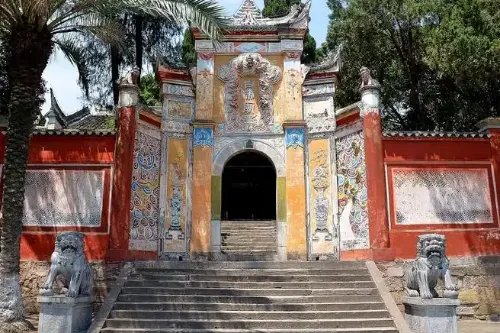
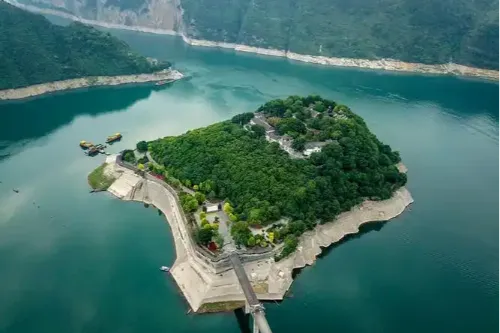
Zhongyi Square
In the center of the square stands a bronze statue of Zhuge Liang. The total height of the statue is 7.9 meters, and the height of the figure is 5 meters. Behind the bronze statue of Zhuge Liang is the stone tablet of "Chu Shi Biao". The whole stele is 16 meters long and 4 meters high, carved from white marble. The front side is "Qian Chu Shi Biao" and the back side is "Hou Chu Shi Biao".
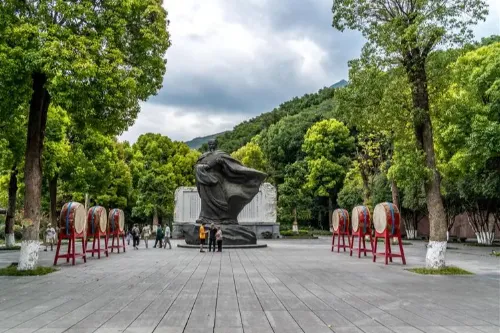
Kuimen
Kuimen is located near Baidicheng. It is the west gate of Qutang Gorge and also an important scenic spot in the Yangtze River Three Gorges. On both sides of Kuimen are high mountains and steep cliffs. When the river flows through here, it forms the magnificent landscape of "Kuimen is the most majestic under heaven". The scenery of Kuimen is so grand and spectacular that it attracts numerous tourists. It is a paradise for photographers and also the location for the pattern on the back of the 10-yuan RMB note.
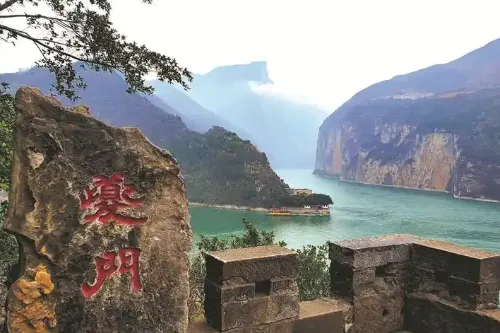
Tuogu Hall
Tuogu Hall was built to commemorate the historical event of Liu Bei entrusting his son to Zhuge Liang. Through sculptures and scene restoration, the hall vividly shows the scene of Liu Bei entrusting his son to Zhuge Liang on his deathbed. The sculptures are lifelike and the scene layout is realistic, making visitors feel as if they have traveled back to the Three Kingdoms period and feel the thickness of history.
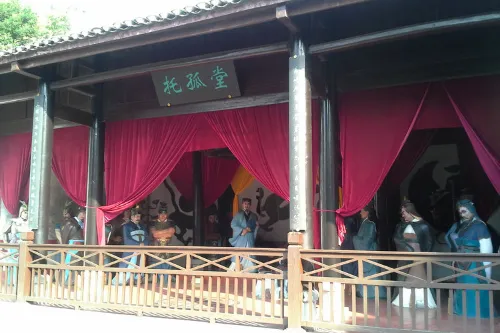
East and West Steles Forests
The East and West Steles Forests display more than 40 inscriptions from past dynasties, which are the material carriers of the "Poetry City" culture of Baidicheng. The East Steles Forest mainly contains inscriptions by literati in the Ming and Qing dynasties. Among them, "Bamboo Leaf Stele" is shaped like a bamboo leaf, but when you look closely, it is the poem "It does not lose the meaning of the eastern bamboo, and its painting is famous alone"; "Phoenix Stele" is carved with phoenix, peony and phoenix tree, also known as "Three Wonders Stele". The West Steles Forest contains important inscriptions from the Sui Dynasty to the Qing Dynasty, such as "Inscription under the Sarira Tower of Jinlun Temple in the Sui Dynasty" and "Record of the Inscription on Adding the Title to Dacheng Hall in the Yuan Dynasty", which have high calligraphic and historical value.
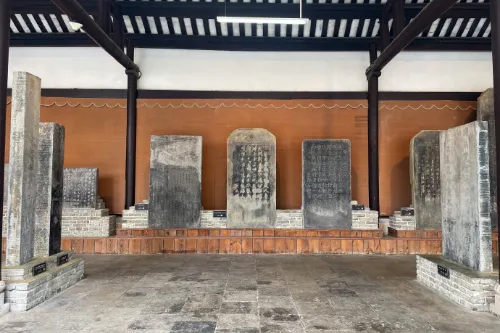
Mingliang Hall
Mingliang Hall is the main hall of Baidi Temple, with a construction area of about 200 square meters. It is located on the central axis of the building complex and is a Qing Dynasty building. Originally, the statue of Gongsun Shu, the White Emperor, was enshrined in the hall, and later it was changed to worship Liu Bei, Zhuge Liang, Guan Yu and Zhang Fei, reflecting the theme of "wise monarchs and good ministers". The plaque "Han Dynasty Mingliang" is hung directly above, which is included in "Famous Plaques of China". The building adopts a beam - lifting structure, with carved doors and windows, and thick beams and columns, showing the typical characteristics of Qing Dynasty temple buildings in the southwest region.
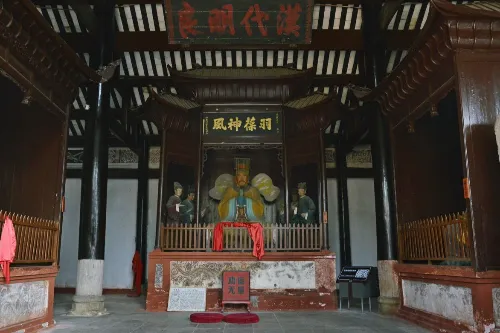
Star - watching Pavilion
The Star - watching Pavilion is a two - story hexagonal pavilion, located on the west side of Baidi Temple. The 12 pillars on the first floor symbolize the 12 months of a year, and the 6 pillars on the upper floor represent the heaven, earth and the four directions of east, south, west and north, reflecting the ancient concept of "harmony between man and nature". It is said that Zhuge Liang once observed the stars here at night to plan military affairs. The stone tables and stone piers in the pavilion are carved with Du Fu's "Eight Poems of Autumn Mood". Climbing the pavilion, you can overlook the scenery of Qutang Gorge, which is a good place for viewing and recalling the past.
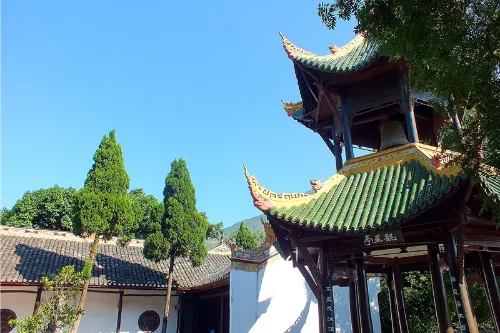
Wind and Rain Covered Bridge
The Wind and Rain Covered Bridge is an important passage connecting Baidicheng Island and the north bank of the Yangtze River, with both transportation and landscape functions. The covered bridge is more than 650 meters long, built in an antique style with overhanging eaves and corners, having an antique flavor, which complements the historical charm of Baidicheng. Walking on it, you can not only take shelter from the wind and rain, but also lean on the railing to overlook the magnificent scenery of the Yangtze River, the majestic posture of Kuimen and the scenery on both banks. It is a unique node to feel the integration of mountains, rivers and humanities on the way to Baidicheng Scenic Area, and also adds a sense of leisure for tourists to enjoy the scenery.
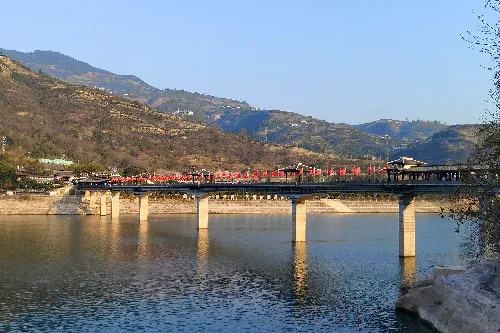
Jiangxia Cultural Museum
Jiangxia Cultural Museum is a special venue displaying the historical culture and natural features of the Three Gorges of the Yangtze River. Through cultural relic exhibitions, multimedia interactions, scene restoration and other ways, the museum systematically presents the geographical changes, folk customs, shipping history and poetry culture of the Three Gorges area. The museum houses precious objects such as components of the ancient plank roads in the Three Gorges, ancient shipping tools, and rubbings of inscriptions of poems about the Gorge written by literati of past dynasties. Among them, the "Three Gorges Migrants" theme exhibition area is particularly attractive, vividly recording the human stories in the construction of the Three Gorges Project.
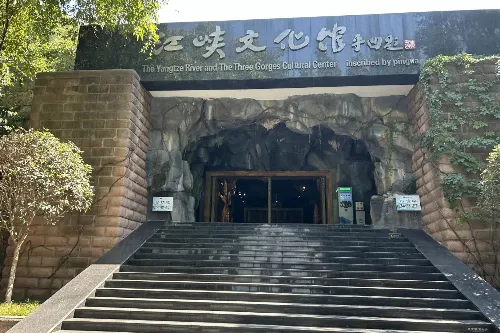
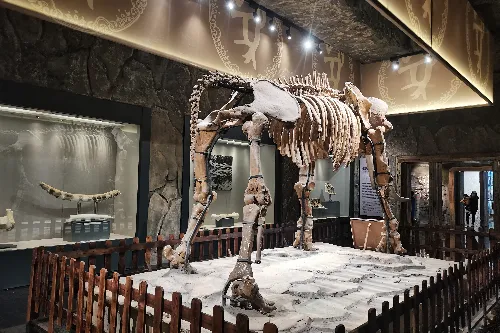
Qutang Pass Ruins Museum
Qutang Pass Ruins Museum is a special museum built on the basis of the ancient ruins of Qutang Pass, focusing on showing the military and transportation history of this "throat of Bashu". Through unearthed cultural relics such as weapons, inscriptions and city bricks, combined with scene restoration and graphic exhibition boards, the museum systematically sorts out the evolution of the military defense system of Qutang Pass from the pre - Qin period to the Ming and Qing dynasties. Among them, the Han Dynasty arrowheads, Song Dynasty city defense components and other objects confirm its strategic position as "one man guards the pass, and ten thousand men cannot get through".
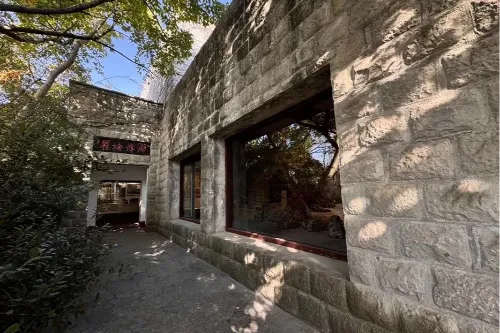
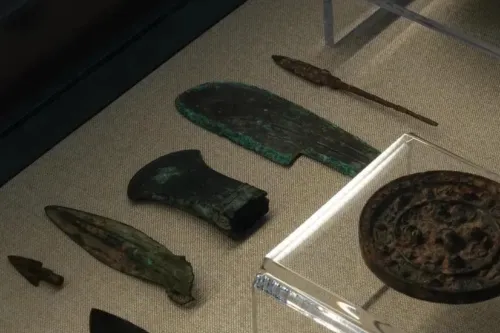
Qutang Gorge
Qutang Gorge is the first of the Three Gorges of the Yangtze River. Starting from Baidicheng in the west and ending at Daxi Town of Wushan County in the east, it is about 8 kilometers long, making it the shortest yet most majestic gorge among the Three Gorges. The cliffs on both sides of the gorge are as steep as if cut by a knife, with the highest point reaching over 1,200 meters above sea level and the narrowest part of the river surface being only about 100 meters wide. Here, the spectacular wonder of "Kuimen is the most majestic under heaven" is on full display, and it is also the location where the pattern on the back of the 10-yuan banknote of the fifth set of RMB is taken. Tourists can take cruise ships to tour the scenic area, enjoy natural and cultural landscapes such as Mengliang Ladder, Daodiao Monk (Hanging Monk) and Rhinoceros Gazing at the Moon, and feel the magnificent momentum of the Three Gorges of the Yangtze River.
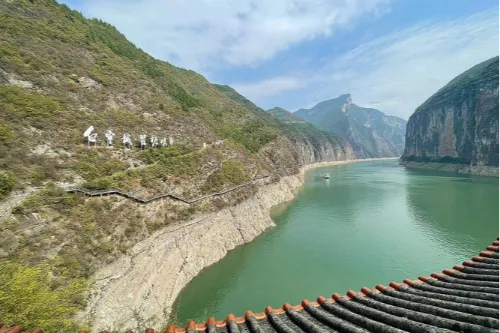
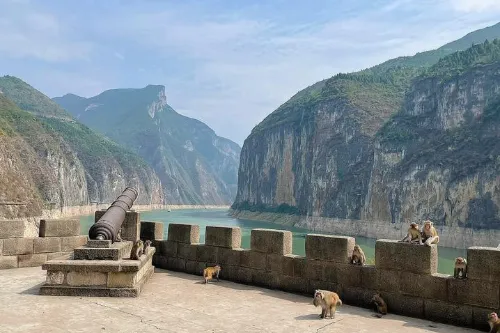
Top of the Three Gorges
Top of the Three Gorges is located on Chijia Mountain on the north bank of Qutang Gorge in the Yangtze River Three Gorges, with an altitude of 1388 meters, making it the highest point of the Yangtze River Three Gorges. It gets its name from Du Fu's poem "Ten Quatrains of Kuizhou" which goes "Chijia and Baiyan stand tall piercing the sky, with villages winding up to the mountain top". Climbing to the top, you can have a 360-degree view of the entire Qutang Gorge, taking in the magnificent scenery of "the majestic Kuimen under heaven" and the boldness of the surging Yangtze River. You can also overlook scenic spots such as Baidicheng and Baiyan Mountain. It is possible to hike from Baidicheng to the Top of the Three Gorges, with the whole journey being about 10 kilometers.
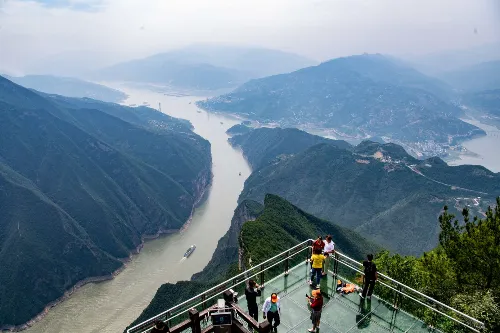
Tour Route
After entering the scenic area, tourists can first visit Baidi Temple, admire the ancient buildings and cultural relics inside the temple, and learn about the Three Kingdoms culture and the history of Baidicheng. Then, head to Tuogu Hall to experience the historical scene of Liu Bei entrusting his son to Zhuge Liang. Next, go to Kuimen to enjoy the magnificent canyon scenery. During the tour, tourists can stop at the viewing platforms in the scenic area to appreciate the beauty of the Yangtze River. The entire tour takes about 2 to 3 hours, and tourists can appropriately adjust the route and stay time according to their own interests and schedules.
Travel Suggestions
- It is recommended that tourists learn about the history and culture of Baidicheng in advance by reading relevant books or watching documentaries, so as to better understand the connotation of the scenic spots during the visit.
- When visiting, pay attention to protecting the cultural relics and environment in the scenic area. Do not touch the cultural relics at will or litter.
- Since some sections in the scenic area are relatively steep, tourists should pay attention to safety, especially the elderly and children, who need to be accompanied by their families.
- When tasting local food, choose regular restaurants to ensure food safety. At the same time, Fengjie navel orange is a local characteristic fruit, so pay attention to selecting fresh ones when buying.
- If you want to take photos of the beautiful scenery of Kuimen, you can go on a sunny day. The best shooting time is early morning or evening, when the light effect is better.
- Combine with other scenic spots in Fengjie County, such as Kuizhou Ancient City and Top of the Three Gorges, to enrich your travel experience.
Matters Needing Attention
- Respect the local customs and religious beliefs, and do not behave inappropriately.
- There may be some steep steps and mountain roads in the scenic area. Tourists should pay attention to walking safety and wear comfortable shoes.
- When visiting the scenic area, follow the arrangement of the staff and do not enter unopened areas without permission.
- There may be some small vendors selling souvenirs around the scenic area. When buying, pay attention to distinguishing the quality and price of the goods to avoid being cheated.
- In case of emergency, you can ask the staff in the scenic area for help. There is a tourist service center in the scenic area that can provide relevant help and services for tourists.
- There are many cultural relics and historic sites in the scenic area. It is strictly forbidden to touch, climb on inscriptions, statues and ancient building components, and to take photos with flash. Please cherish the cultural heritage.
- When sailing on the Qutang Gorge cruise ship, follow the crew's instructions, wear life-saving equipment, do not chase and play on the edge of the deck, and pay attention to water safety.
- When buying cruise tickets, confirm the route and time to avoid affecting the trip due to schedule issues.
Transportation
- Airplane: Tourists can first arrive at Chongqing Jiangbei International Airport, then take a long-distance bus or transfer to a high-speed rail at the airport to Fengjie County. After arriving in Fengjie, you can take a local bus or taxi to Baidicheng Scenic Area. It takes about 4 to 5 hours by long-distance bus and about 2 hours by high-speed rail from Chongqing Jiangbei International Airport to Fengjie County.
- Train: After arriving at Fengjie Station by train, you can take a bus or taxi to Baidicheng Scenic Area. It takes about 30 minutes by bus and about 20 minutes by taxi from Fengjie Station to Baidicheng Scenic Area.
- Self-driving: Enter "Baidicheng" through the navigation software and follow the navigation route. There is a parking lot in the scenic area for the convenience of tourists. Self-driving tourists should pay attention to the road conditions, especially in mountainous sections, and drive carefully.
Opening Hours
Baidicheng Scenic Area is open all year round. In summer (May 1 - October 31), the opening hours are 08:00 - 17:30; in winter (November 1 - April 30 of the next year), the opening hours are 08:30 - 17:00. Tourists can enter the scenic area during the opening hours. The scenic area will adjust the opening hours according to the actual situation, and the specific opening hours are subject to the announcement of the scenic area.
Tickets
The ticket price of Baidicheng Scenic Area is 100 yuan per person. There may be some separately charged items in the scenic area, and the specific fees can be consulted in the scenic area. At the same time, the scenic area will launch some preferential policies according to different seasons and activities. Tourists can learn about the latest ticket information through the official channels of the scenic area.
You can search for the official WeChat public account of the scenic area "白帝城瞿塘峡景区" to get the latest news or buy tickets online.
Online Booking
Click here to jump to the Trip.com ticketing platform for ticket purchase.